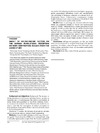Please use this identifier to cite or link to this item:
https://accedacris.ulpgc.es/jspui/handle/10553/40341
| Title: | 144/2069. Impact of socioeconomic factors on the Spanish population's perception on body composition: results from the Anibes Study | Authors: | Partearroyo, Teresa Samaniego-Vaesken, Ma de Lourdes Ruiz, Emma Aranceta-Bartrina, Javier Gil, Ángel González-Gross, Marcela Ortega, Rosa M. Majem, Luis Serra Varela, Gregoria |
UNESCO Clasification: | 3206 Ciencias de la nutrición | Keywords: | Body Mass Index Obesity Perception Socioeconomic Status |
Issue Date: | 2017 | Journal: | Annals of Nutrition and Metabolism | Conference: | IUNS 21st International Congress of Nutrition Buenos Aires, Argentina, October 15–20, 2017 | Abstract: | besity prevalence is well known and many factors can play an important role in its development. The relative contributions of energy intake and expenditure to the obesity epidemic, however, remain poorly defined in Spain. Moreover, few studies in our country undertake the investigation of subject’s perception on their nutritional status and its relation with socioeconomic status in the Spanish population. Objectives: To analyse the relevance of perception, attitudes and socioeconomic status in relation to body composition Methods: A total de 2009 individuals (1,013 men, 996 women), aged 9–75 years from the ANIBES cross-sectional Study using a nationally-representative sample from the Spanish population was studied. The following variables were investigated: age groups, gender, geographical distribution, locality size, unemployment rate, percentage of foreigners, education or economic level, anthropometric factors Anthropometry measurements (weight, height, body mass index, waist circumference, % body fat, % body water), perceived health, quality of life and diet. Results: Body fat percentage (%) decreases with increasing habitat size, population density (χ² =0,042) and socioeconomic status (χ² =0,000). Individuals have a clearer perception of their weight (χ² =0,000) as well as their diet (χ² =0,000) related to body fat composition. A better health status perception is observed in subjects with lower BMI values, while higher BMI subjects declare a higher effort to improve their diets (χ² =0,004). At normal BMI values, better perception of weight and diet (χ² =0,000) and at lower BMIs, subjects declare higher number of hours of sleep (χ² =0,000). Conclusions: Self-reported perception on diet and health status are associated with an adequate body image in the Spanish population. In addition, subjects living in cities with higher population density and having a better socioeconomic status present lower obesity prevalence | URI: | https://accedacris.ulpgc.es/handle/10553/40341 | ISSN: | 0250-6807 | Source: | Annals Of Nutrition And Metabolism[ISSN 0250-6807],v. 71 sup. 2, p. 796, Abstract 144/2069 |
| Appears in Collections: | Actas de congresos |
Page view(s)
285
checked on Jan 15, 2026
Download(s)
50
checked on Jan 15, 2026
Google ScholarTM
Check
Share
Export metadata
Items in accedaCRIS are protected by copyright, with all rights reserved, unless otherwise indicated.
